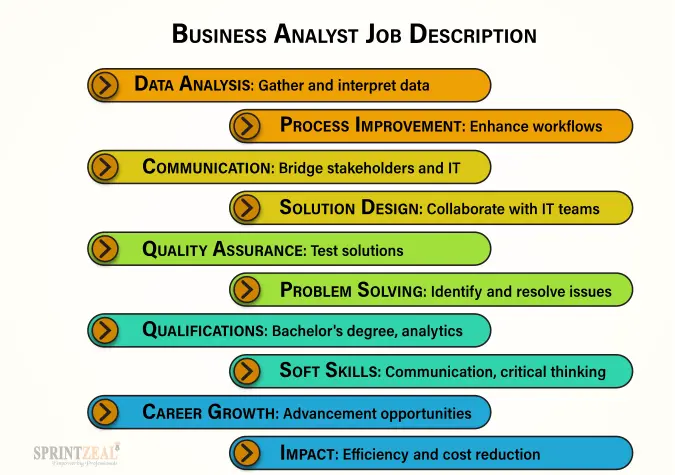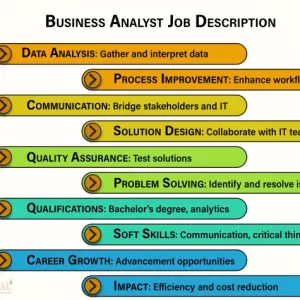

Who is an entry level business analyst? A business analyst is a person who analyzes an organization or business to improve its efficiency. They use their skills in data analysis, process improvement, and project management to identify areas where a business can improve. Entry-level business analysts are typically recent college graduates with a bachelor’s degree in business administration, computer science, or a related field.
Editor’s Note: Entry-level business analysts play a vital role in the success of any organization. They provide valuable insights that can help businesses improve their operations and achieve their goals.
To help you understand the role of an entry-level business analyst, we’ve put together this comprehensive guide. In this guide, we’ll cover the following topics:
- The different types of entry-level business analyst jobs
- The skills and qualifications required to become an entry-level business analyst
- The job outlook for entry-level business analysts
- The salary expectations for entry-level business analysts
- The career path for entry-level business analysts
By the end of this guide, you’ll have a good understanding of what it takes to become an entry-level business analyst and whether or not this career path is right for you.
Entry Level Business Analyst
Entry-level business analysts play a vital role in the success of any organization. They provide valuable insights that can help businesses improve their operations and achieve their goals. To be successful in this role, entry-level business analysts need to have a strong foundation in the following key aspects:
- Analytical skills
- Problem-solving skills
- Communication skills
- Business knowledge
- Technical skills
- Project management skills
- Industry knowledge
- Ethics
- Teamwork
Entry-level business analysts who are strong in these key areas can make a significant contribution to their organizations. For example, they can help businesses to:
- Identify and solve problems
- Improve efficiency and productivity
- Develop new products and services
- Make better decisions
- Increase profits
If you are interested in a career as an entry-level business analyst, it is important to develop your skills in these key areas. You can do this by taking courses, reading books and articles, and working on projects that involve business analysis.
Analytical skills
Analytical skills are essential for entry-level business analysts. They allow analysts to collect, interpret, and make sense of data in order to identify problems and opportunities for improvement. Without strong analytical skills, business analysts would not be able to effectively perform their jobs.
There are many different types of analytical skills that entry-level business analysts need. These skills include:
Suggested read: Unveiling the Secrets to a Thriving Career in Business Analysis
- Data collection and analysis: Business analysts need to be able to collect data from a variety of sources, including interviews, surveys, and financial statements. They also need to be able to analyze this data to identify trends and patterns.
- Problem-solving: Business analysts need to be able to identify and solve problems. They need to be able to think critically and creatively in order to come up with solutions that are both effective and efficient.
- Communication: Business analysts need to be able to communicate their findings to a variety of stakeholders, including managers, executives, and customers. They need to be able to clearly and concisely explain their analysis and recommendations.
Entry-level business analysts who have strong analytical skills can make a significant contribution to their organizations. For example, they can help businesses to:
- Identify and solve problems
- Improve efficiency and productivity
- Develop new products and services
- Make better decisions
- Increase profits
If you are interested in a career as an entry-level business analyst, it is important to develop your analytical skills. You can do this by taking courses, reading books and articles, and working on projects that involve business analysis.
Problem-solving skills
Problem-solving skills are essential for entry-level business analysts. They allow analysts to identify and solve problems in order to improve the efficiency and productivity of an organization. Without strong problem-solving skills, business analysts would not be able to effectively perform their jobs.
There are many different types of problems that entry-level business analysts may need to solve. These problems can range from simple to complex, and can involve a variety of different factors. For example, an entry-level business analyst may need to solve problems related to:
- Process inefficiencies
- Data inaccuracies
- Customer complaints
- New product development
- Financial forecasting
To solve these problems, entry-level business analysts need to be able to think critically and creatively. They need to be able to identify the root cause of the problem, and then develop and implement a solution that is both effective and efficient.
Entry-level business analysts who have strong problem-solving skills can make a significant contribution to their organizations. For example, they can help businesses to:
- Identify and solve problems
- Improve efficiency and productivity
- Develop new products and services
- Make better decisions
- Increase profits
If you are interested in a career as an entry-level business analyst, it is important to develop your problem-solving skills. You can do this by taking courses, reading books and articles, and working on projects that involve problem-solving.
Communication skills
Communication skills are essential for entry-level business analysts. They allow analysts to effectively communicate their findings and recommendations to a variety of stakeholders, including managers, executives, and customers. Without strong communication skills, business analysts would not be able to effectively perform their jobs.
There are many different types of communication skills that entry-level business analysts need. These skills include:
- Verbal communication: Business analysts need to be able to clearly and concisely communicate their findings and recommendations verbally. They need to be able to speak in a way that is easy to understand and engaging.
- Written communication: Business analysts need to be able to clearly and concisely communicate their findings and recommendations in writing. They need to be able to write in a way that is easy to read and understand.
- Presentation skills: Business analysts need to be able to effectively present their findings and recommendations to a variety of audiences. They need to be able to use visual aids and other tools to make their presentations clear and engaging.
Entry-level business analysts who have strong communication skills can make a significant contribution to their organizations. For example, they can help businesses to:
Suggested read: Uncover Business Analyst Intern Insights: A Gateway to Success
- Identify and solve problems
- Improve efficiency and productivity
- Develop new products and services
- Make better decisions
- Increase profits
If you are interested in a career as an entry-level business analyst, it is important to develop your communication skills. You can do this by taking courses, reading books and articles, and practicing your communication skills in real-world situations.
Business knowledge
Business knowledge is essential for entry-level business analysts. It allows analysts to understand the different aspects of a business, including its operations, financial statements, and market position. Without a strong foundation in business knowledge, entry-level business analysts would not be able to effectively perform their jobs.
There are many different types of business knowledge that entry-level business analysts need. These types of knowledge include:
- Financial knowledge: Business analysts need to be able to understand financial statements and other financial data. This knowledge allows them to assess the financial health of a business and make recommendations for improvement.
- Operational knowledge: Business analysts need to be able to understand the different aspects of a business’s operations. This knowledge allows them to identify inefficiencies and make recommendations for improvement.
- Market knowledge: Business analysts need to be able to understand the market in which a business operates. This knowledge allows them to assess the competitive landscape and make recommendations for how to improve a business’s market position.
Entry-level business analysts who have a strong foundation in business knowledge can make a significant contribution to their organizations. For example, they can help businesses to:
- Identify and solve problems
- Improve efficiency and productivity
- Develop new products and services
- Make better decisions
- Increase profits
If you are interested in a career as an entry-level business analyst, it is important to develop your business knowledge. You can do this by taking courses, reading books and articles, and working on projects that involve business analysis.
| Skill | Importance | How to Develop |
|---|---|---|
| Financial knowledge | Essential for understanding a business’s financial health | Take courses in finance and accounting, read financial news and articles, and work on projects that involve financial analysis |
| Operational knowledge | Essential for understanding how a business operates | Take courses in operations management, read articles about different industries, and work on projects that involve process improvement |
| Market knowledge | Essential for understanding the competitive landscape | Take courses in marketing and economics, read industry reports, and work on projects that involve market research |
Technical skills
Technical skills are essential for entry-level business analysts. They allow analysts to collect, analyze, and interpret data, and to develop and implement solutions to business problems. Without strong technical skills, entry-level business analysts would not be able to effectively perform their jobs.
There are many different types of technical skills that entry-level business analysts need. These skills include:
- Data analysis skills: Business analysts need to be able to collect, clean, and analyze data from a variety of sources. They need to be able to use statistical techniques to identify trends and patterns in data, and to develop insights that can help businesses improve their operations.
- Database management skills: Business analysts need to be able to design, develop, and manage databases. They need to be able to use SQL and other database languages to query data and to generate reports.
- Programming skills: Business analysts need to be able to write code in a variety of programming languages. This allows them to develop custom applications and scripts to automate tasks and to analyze data.
- Data visualization skills: Business analysts need to be able to create clear and concise visualizations of data. This allows them to communicate their findings to stakeholders in a way that is easy to understand.
Entry-level business analysts who have strong technical skills can make a significant contribution to their organizations. For example, they can help businesses to:
- Identify and solve problems
- Improve efficiency and productivity
- Develop new products and services
- Make better decisions
- Increase profits
If you are interested in a career as an entry-level business analyst, it is important to develop your technical skills. You can do this by taking courses, reading books and articles, and working on projects that involve data analysis, database management, programming, and data visualization.
| Skill | Importance | How to Develop |
|---|---|---|
| Data analysis skills | Essential for understanding data and identifying trends | Take courses in statistics and data analysis, read books and articles about data analysis techniques, and work on projects that involve data analysis |
| Database management skills | Essential for designing, developing, and managing databases | Take courses in database management, read books and articles about database management systems, and work on projects that involve database development |
| Programming skills | Essential for developing custom applications and scripts | Take courses in programming, read books and articles about programming languages, and work on projects that involve programming |
| Data visualization skills | Essential for communicating findings to stakeholders | Take courses in data visualization, read books and articles about data visualization techniques, and work on projects that involve data visualization |
Project management skills
Project management skills are essential for entry-level business analysts. They allow analysts to plan, execute, and close projects successfully. Without strong project management skills, entry-level business analysts would not be able to effectively perform their jobs.
Suggested read: Unveiling the Secrets of Artist Business Cards: Tips and Tricks for Unmatched Impact
- Planning: Business analysts need to be able to plan projects effectively. This includes defining the project scope, objectives, and timeline. They also need to be able to identify and mitigate risks.
- Execution: Business analysts need to be able to execute projects successfully. This includes managing the project team, tracking progress, and making necessary adjustments.
- Closing: Business analysts need to be able to close projects successfully. This includes delivering the projects, evaluating the project’s success, and documenting lessons learned.
- Stakeholder management: Business analysts need to be able to manage stakeholders effectively. This includes communicating with stakeholders, managing expectations, and resolving conflicts.
Entry-level business analysts who have strong project management skills can make a significant contribution to their organizations. For example, they can help businesses to:
- Deliver projects on time and within budget
- Meet customer expectations
- Improve efficiency and productivity
- Reduce risks
If you are interested in a career as an entry-level business analyst, it is important to develop your project management skills. You can do this by taking courses, reading books and articles, and working on projects that involve project management.
Industry knowledge
Industry knowledge is essential for entry-level business analysts. It allows them to understand the specific context of the business they are working with and to make recommendations that are tailored to that business’s needs. Without industry knowledge, entry-level business analysts would not be able to effectively perform their jobs.
There are many different types of industry knowledge that entry-level business analysts need. These types of knowledge include:
- General industry knowledge: This type of knowledge includes an understanding of the industry’s history, structure, and major players. It also includes an understanding of the industry’s key trends and challenges.
- Specific industry knowledge: This type of knowledge includes an understanding of the specific company or organization that the business analyst is working with. It also includes an understanding of the company’s products or services, its customers, and its competitors.
Entry-level business analysts who have strong industry knowledge can make a significant contribution to their organizations. For example, they can help businesses to:
- Identify and solve problems
- Improve efficiency and productivity
- Develop new products and services
- Make better decisions
- Increase profits
If you are interested in a career as an entry-level business analyst, it is important to develop your industry knowledge. You can do this by reading industry reports, attending industry events, and networking with people who work in your industry.
| Type of Industry Knowledge | Importance | How to Develop |
|---|---|---|
| General industry knowledge | Essential for understanding the industry’s context | Read industry reports, attend industry events, and network with people who work in your industry |
| Specific industry knowledge | Essential for understanding the specific company or organization that the business analyst is working with | Read the company’s website and annual reports, talk to employees and customers, and visit the company’s facilities |
Ethics
Ethics are a set of moral principles that guide our behavior. They help us to distinguish between right and wrong, and to make decisions that are in line with our values. Ethics are important in all aspects of life, but they are especially important in the business world.
Entry-level business analysts are responsible for gathering, analyzing, and interpreting data to help businesses make better decisions. In order to do this effectively, they need to have a strong foundation in ethics. This is because the data they collect and analyze can be sensitive, and the decisions they make can have a significant impact on the business and its stakeholders.
There are many different ethical issues that entry-level business analysts may face. These issues can include:
- Conflicts of interest: Business analysts may be faced with situations in which they have a personal or financial interest in the outcome of their analysis. This can make it difficult for them to be objective and impartial.
- Confidentiality: Business analysts may have access to confidential information that could be harmful to the business if it were to be leaked. They need to be able to keep this information confidential and to protect it from unauthorized access.
- Accuracy and integrity: Business analysts need to be able to trust the data they are working with. They need to be able to verify the accuracy of the data and to ensure that it has not been tampered with.
- Transparency: Business analysts need to be transparent about their methods and findings. They need to be able to explain how they came to their conclusions and to provide evidence to support their recommendations.
Entry-level business analysts who adhere to high ethical standards can make a significant contribution to their organizations. They can help businesses to make better decisions, to avoid risks, and to build trust with their stakeholders.
Suggested read: Franchise Business for Sale – Find Profitable Opportunities Near You
| Ethical Issue | Importance | How to Address |
|---|---|---|
| Conflicts of interest | Can lead to biased or inaccurate analysis | Declare any conflicts of interest and recuse yourself from any decision-making that could be affected by the conflict |
| Confidentiality | Can damage the business’s reputation and trust | Keep all confidential information confidential and protect it from unauthorized access |
| Accuracy and integrity | Can lead to bad decisions and financial losses | Verify the accuracy of all data and ensure that it has not been tampered with |
| Transparency | Builds trust and confidence in the business analyst | Explain your methods and findings clearly and provide evidence to support your recommendations |
Teamwork
Teamwork is essential for entry-level business analysts. They work with a variety of people, including other analysts, project managers, and stakeholders, to gather and analyze data, develop recommendations, and implement solutions. Without strong teamwork skills, entry-level business analysts would not be able to effectively perform their jobs.
-
Communication
Entry-level business analysts need to be able to communicate effectively with a variety of people, including other analysts, project managers, and stakeholders. They need to be able to clearly and concisely explain their findings and recommendations, and to be able to listen to and understand the needs of others.
-
Collaboration
Entry-level business analysts need to be able to collaborate effectively with others to achieve common goals. They need to be able to work together to gather data, develop recommendations, and implement solutions. They also need to be able to resolve conflicts and to build consensus.
-
Problem-solving
Entry-level business analysts need to be able to solve problems effectively. They need to be able to identify problems, develop solutions, and implement those solutions. They also need to be able to think critically and to be creative.
-
Time management
Entry-level business analysts need to be able to manage their time effectively. They often have multiple projects going on at the same time, and they need to be able to prioritize their work and meet deadlines.
Entry-level business analysts who have strong teamwork skills can make a significant contribution to their organizations. They can help businesses to improve their efficiency and productivity, to make better decisions, and to achieve their goals.
Suggested read: Unlock the Secrets of Apple Maps: Discover the Path to Business Success
Identify and solve problems
Identifying and solving problems is a critical skill for entry-level business analysts. Businesses face a variety of problems, both large and small, and it is the job of the business analyst to help identify and solve these problems in order to improve the efficiency and profitability of the business.
There are many different types of problems that entry-level business analysts may be called upon to solve. These problems can range from simple process inefficiencies to complex strategic challenges. Regardless of the type of problem, the business analyst must be able to follow a structured approach to problem-solving in order to identify the root cause of the problem and develop a solution that is both effective and efficient.
The problem-solving process typically involves the following steps:
- Identify the problem
- Gather data
- Analyze the data
- Develop a solution
- Implement the solution
- Evaluate the results
Entry-level business analysts who are able to effectively identify and solve problems can make a significant contribution to their organizations. By helping to improve the efficiency and profitability of the business, business analysts can help businesses to achieve their goals and objectives.
| Skill | Importance | How to Develop |
|---|---|---|
| Problem-solving | Essential for identifying and solving business problems | Take courses in problem-solving, read books and articles about problem-solving techniques, and work on projects that involve problem-solving |
| Data analysis | Essential for gathering and analyzing data to identify problems | Take courses in data analysis, read books and articles about data analysis techniques, and work on projects that involve data analysis |
| Communication | Essential for communicating findings and recommendations to stakeholders | Take courses in communication, read books and articles about communication techniques, and work on projects that involve communication |
Improve efficiency and productivity
Improving efficiency and productivity is a key goal for many businesses, and entry-level business analysts can play a vital role in helping businesses achieve this goal. By identifying and solving problems, improving processes, and developing new solutions, business analysts can help businesses to operate more efficiently and productively.
-
Process improvement
One of the most important ways that business analysts can improve efficiency is by identifying and improving processes. By analyzing existing processes, business analysts can identify bottlenecks and inefficiencies, and develop solutions to improve the flow of work. For example, a business analyst might identify that a particular process is taking too long to complete, and develop a solution to automate parts of the process or to streamline the workflow.
-
Data analysis
Business analysts can also use data analysis to identify opportunities to improve efficiency and productivity. By analyzing data on productivity, costs, and other metrics, business analysts can identify areas where the business can improve its performance. For example, a business analyst might analyze data on customer service calls to identify the most common problems that customers experience, and develop solutions to prevent these problems from occurring in the future.
-
New solutions
Suggested read: Unveil the Secrets of Business Professional Outfits for Women: A Guide to Success
In addition to improving existing processes and systems, business analysts can also develop new solutions to improve efficiency and productivity. For example, a business analyst might develop a new system for tracking and managing inventory, or a new way to automate a particular task. These new solutions can help businesses to save time and money, and to improve the overall efficiency of their operations.
By improving efficiency and productivity, business analysts can help businesses to achieve their goals and objectives. Businesses that are more efficient and productive are able to produce more goods and services with fewer resources, which can lead to increased profits and improved customer satisfaction.
Develop new products and services
Entry-level business analysts play a vital role in the development of new products and services. They work with product managers, engineers, and other stakeholders to identify customer needs, develop product requirements, and create business cases for new products and services.
-
Market research
Entry-level business analysts conduct market research to identify customer needs and wants. They use this information to develop product requirements that meet the needs of the target market.
-
Product planning
Entry-level business analysts work with product managers to develop product plans. These plans outline the product’s features, benefits, and target market. They also include a timeline for the product’s development and launch.
-
Business case development
Entry-level business analysts develop business cases for new products and services. These business cases outline the potential costs and benefits of the product or service. They also include a financial analysis to justify the investment.
-
Stakeholder management
Suggested read: Unlock the Secrets of Coaching Business Coaches: Discoveries for Business Success
Entry-level business analysts manage stakeholders throughout the product development process. They keep stakeholders informed about the progress of the project and address any concerns they may have.
By playing a vital role in the development of new products and services, entry-level business analysts can help businesses to grow and succeed. They can also gain valuable experience in product management, market research, and financial analysis.
Make better decisions
Entry-level business analysts play a critical role in helping organizations make better decisions. They use their analytical skills to gather and interpret data, identify trends and patterns, and develop recommendations that can help businesses improve their operations and achieve their goals.
-
Data analysis
Entry-level business analysts use data analysis to identify trends and patterns in data. This information can be used to make better decisions about everything from product development to marketing campaigns.
-
Process improvement
Entry-level business analysts can also help businesses improve their processes by identifying inefficiencies and bottlenecks. They can then develop recommendations for how to improve these processes, which can lead to cost savings and increased efficiency.
-
Risk management
Entry-level business analysts can also help businesses manage risk by identifying potential risks and developing strategies to mitigate those risks. This can help businesses avoid costly mistakes and protect their bottom line.
-
Strategic planning
Suggested read: Uncover the Secrets of Business Formal Attire for Women: A Guide to Success
Entry-level business analysts can also help businesses with strategic planning by developing long-term plans that align with the organization’s goals and objectives. This can help businesses make better decisions about how to allocate resources and achieve their strategic objectives.
By making better decisions, entry-level business analysts can help organizations improve their performance, reduce costs, and achieve their goals. As a result, they are in high demand and can be found in a variety of industries, including healthcare, finance, and manufacturing.
Increase profits
Entry-level business analysts play a vital role in helping organizations increase profits. They use their analytical skills to identify areas where businesses can improve their efficiency and productivity, and they develop recommendations that can help businesses make better decisions. As a result, entry-level business analysts can have a significant impact on an organization’s bottom line.
-
Process improvement
One of the most important ways that entry-level business analysts can help businesses increase profits is by identifying and improving processes. By analyzing existing processes, business analysts can identify bottlenecks and inefficiencies, and they can develop solutions to improve the flow of work. For example, a business analyst might identify that a particular process is taking too long to complete, and they might develop a solution to automate parts of the process or to streamline the workflow. This can lead to significant cost savings for the business, which can then be used to increase profits.
-
Data analysis
Entry-level business analysts can also use data analysis to identify opportunities to increase profits. By analyzing data on sales, marketing, and other metrics, business analysts can identify trends and patterns that can be used to make better decisions. For example, a business analyst might analyze data on customer purchases to identify which products are most profitable, and they might then develop recommendations for how to increase sales of those products. This can lead to increased revenue for the business, which can then be used to increase profits.
-
New products and services
Entry-level business analysts can also help businesses increase profits by developing new products and services. By working with product managers and other stakeholders, business analysts can identify customer needs and wants, and they can develop product requirements that meet those needs. They can also develop business cases for new products and services, which can be used to justify the investment in those products and services. If the new products and services are successful, they can lead to increased revenue and profits for the business.
-
Cost reduction
Suggested read: Uncover Business Secrets: Dive into Nebraska's Entity Search
Finally, entry-level business analysts can also help businesses increase profits by reducing costs. By analyzing costs and expenses, business analysts can identify areas where the business can save money. For example, a business analyst might identify that a particular supplier is charging too much for a particular product or service, and they might then develop a strategy to negotiate a lower price. This can lead to significant cost savings for the business, which can then be used to increase profits.
These are just a few of the ways that entry-level business analysts can help businesses increase profits. By using their analytical skills to identify opportunities for improvement, business analysts can make a significant contribution to an organization’s bottom line.
Frequently Asked Questions
This section addresses commonly asked questions and misconceptions about entry-level business analysts.
Question 1: What is the role of an entry-level business analyst?
Entry-level business analysts are responsible for gathering, analyzing, and interpreting data to help businesses make better decisions. They work with stakeholders to identify business needs, develop solutions, and improve processes.
Question 2: What skills are required to be an entry-level business analyst?
Entry-level business analysts need strong analytical, problem-solving, and communication skills. They should also be proficient in data analysis and modeling techniques.
Question 3: What is the career path for an entry-level business analyst?
Suggested read: Unveiling the Secrets of Realtor Business Cards: A Guide to Success
Entry-level business analysts can advance to senior business analyst, business systems analyst, or other management positions. With experience and additional education, they can also become certified business analysts.
Question 4: What is the job outlook for entry-level business analysts?
The job outlook for entry-level business analysts is expected to grow faster than average in the coming years. This is due to the increasing demand for data-driven decision-making in businesses.
Question 5: What is the salary range for entry-level business analysts?
The salary range for entry-level business analysts varies depending on experience, location, and industry. However, according to the U.S. Bureau of Labor Statistics, the median annual salary for business analysts is $87,660.
Question 6: What are the benefits of being an entry-level business analyst?
Entry-level business analysts enjoy a variety of benefits, including the opportunity to work on challenging projects, make a real impact on businesses, and develop valuable skills that can be used in a variety of industries.
These are just a few of the most frequently asked questions about entry-level business analysts. If you have any other questions, please feel free to contact us.
Next: Entry-Level Business Analyst Career Path
Tips for Entry-Level Business Analysts
Entry-level business analysts play a vital role in the success of any organization. They provide valuable insights that can help businesses improve their operations and achieve their goals. To be successful in this role, entry-level business analysts need to have a strong foundation in the following key areas:
- Analytical skills
- Problem-solving skills
- Communication skills
- Business knowledge
- Technical skills
- Project management skills
- Industry knowledge
- Ethics
- Teamwork
In addition to these key skills, entry-level business analysts can also benefit from following these tips:
Tip 1: Get involved in projects early on
One of the best ways to learn about business analysis is to get involved in projects early on. This will give you the opportunity to apply your skills in a real-world setting and to learn from experienced business analysts.
Tip 2: Don’t be afraid to ask questions
If you don’t understand something, don’t be afraid to ask questions. This is the best way to learn and to ensure that you are completing your work correctly.
Tip 3: Be organized and detail-oriented
Business analysts need to be able to organize and manage large amounts of information. They also need to be able to pay attention to detail and to be accurate in their work.
Tip 4: Be a team player
Business analysts often work on projects with other team members. It is important to be able to work well with others and to be able to contribute to the team’s success.
Tip 5: Stay up-to-date on industry trends
The business analysis field is constantly changing. It is important to stay up-to-date on industry trends and to continue to develop your skills.
By following these tips, entry-level business analysts can increase their chances of success in this challenging and rewarding field.
Conclusion
Entry-level business analysts play a vital role in the success of any organization. They provide valuable insights that can help businesses improve their operations and achieve their goals. To be successful in this role, entry-level business analysts need to have a strong foundation in analytical skills, problem-solving skills, communication skills, business knowledge, technical skills, project management skills, industry knowledge, ethics, and teamwork.
Entry-level business analysts can make a significant contribution to their organizations by helping to identify and solve problems, improve efficiency and productivity, develop new products and services, make better decisions, and increase profits. As the demand for data-driven decision-making continues to grow, the job outlook for entry-level business analysts is expected to remain strong.
Youtube Video:






